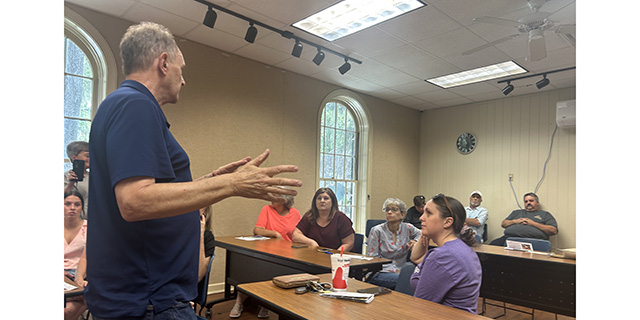Statutory requirements make budgeting a challenge
Published 8:00 am Friday, January 22, 2021

- The Iberia Parish Council has been unable to pass millages to cover some of the basic functions of government, like funding the Iberia Parish Jail.
Whenever the issue of millages and taxes comes up in Iberia Parish, the spotlight quickly and harshly falls on the administration and the parish council.
But the role of those elected officials and their staff cover less than a third of the typical parish resident’s tax burden. Much of that bill is collected through other entities.
For example, the Iberia Parish Council collected 20.52 mills in ad valorem tax on property last year. That is less than a third of the 76.82 mills that was levied on properties in the unincorporated areas of the parish.
Several other entities also levy taxes in the parish. The Iberia Parish School District, for example, has not only a 10.6 mills ad valorem tax but also a 2 percent sales tax. The Iberia Parish Sheriff’s Office levies more than $6 million in ad valorem taxes and another $3 million in sales taxes. Iberia Parish Fire District No. 1, formerly under the parish council’s control, now has full authority over its 6 mill ad valorem tax.
There are other levies as well that make up the other two-thirds of the average property owner’s tax bill. But the difference between the millages the Iberia Parish Council controls and those of other political bodies is that those other bodies use the taxes collected for their specific activities.
Under the Louisiana Constitution, there are several specific duties that a parish government must fund. Providing for the operation of the jail is one. Making sure the courts have a building and offices is another. Covering the expenses for the government itself and for civil defense (now known as Homeland Security) are two others. Portions of the expenses — and in some cases the entire cost — of the sheriff, clerk of court, assessor, district attorney, coroner and registrar of voters falls on the parish government.
Other things that voters see as governmental responsibilities really aren’t, at least not under state law. Paying for roads, for example, isn’t required by statute. Neither is providing for drainage, or parks, or libraries. Over the years they have become the responsibility of the government, but the law doesn’t mandate they be funded.
Many responsibilities covered in the parish budget seem to fall under the bailiwick of other organizations. The Iberia Parish Jail, for example — which currently costs the parish government more than $2 million per year — would seem to be a law enforcement responsibility. But even though the Iberia Parish Sheriff’s Office may make money housing state or federal prisoners, they do not share that windfall with the parish government.
The current criminal justice facility maintenance ad valorem tax brings in about $350,000, not nearly enough to cover the $2 million needed. The lion’s share of that money for 2021 — $1 million — instead comes from the parish’s public building maintenance fund. Another $540,000 comes from the parish’s health unit maintenance fund.
Making the challenge more difficult is the demise of the parish’s oil royalty revenue. The parish royalty fund is budgeted to kick in $150,000 for jail operations and maintenance this year. But that fund is starting the year with almost $4 million and is expected to end the year with just above $1 million. Of the royalty funds to be expended in 2021, $2.8 million is in existing fund balance from previous years. Only $300,000 is projected royalty income.
That means that in 2022 — unless something drastic happens — the fund will not be able to support the expenses it is funding this year.
There have been efforts to use creative partnerships or federal funding to alleviate some of these unfunded mandates. In St. Martin Parish, for example, the administration entered into an agreement with Lafayette Healthcare to provide medical care for inmates, one of those constitutionally mandated expenses. In Iberia Parish, federal Gulf of Mexico Energy Security Act (GOMESA) funds are being used to build flood control features and lift stations to alleviate the threat of flooding in three areas of the parish.
St. Martin Parish went in another direction, using its projected GOMESA revenue to support a bond issue for capital projects, including the replacement of the pontoon bridge at Butte La Rose.
Even with these creative efforts, the challenge of supporting the services residents have come to expect — and demand — is real. The ongoing economic slump, combined with the uncertainty of a COVID-19 tinged economy, makes budgeting even less of a science than in more stable times.
The Iberia Parish Jail is a good example of how property taxes are spent in the parish. In 2021, the administration will provide the following for jail operations, as required under state law:
Ad valorem tax revenue $350,109
State shared revenue $35,000
Investment income $660
Reimbursements $10,000
Existing fund balance $83,617
Health Unit Maintenance Fund $540,000
Public Building Maintenance Fund $1,000,000
Royalty Fund $150,000
TOTAL $2,169,386





